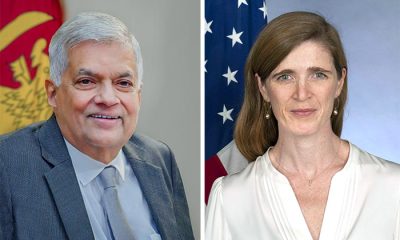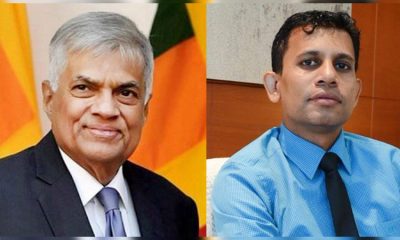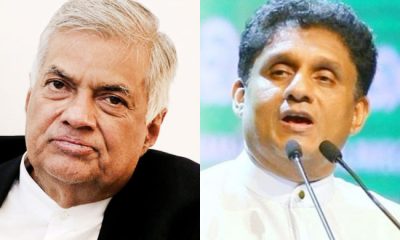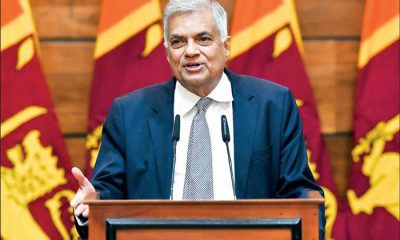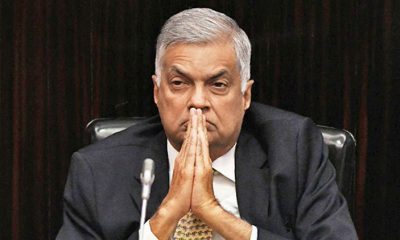Features
Credibility in governance through elections and not security forces
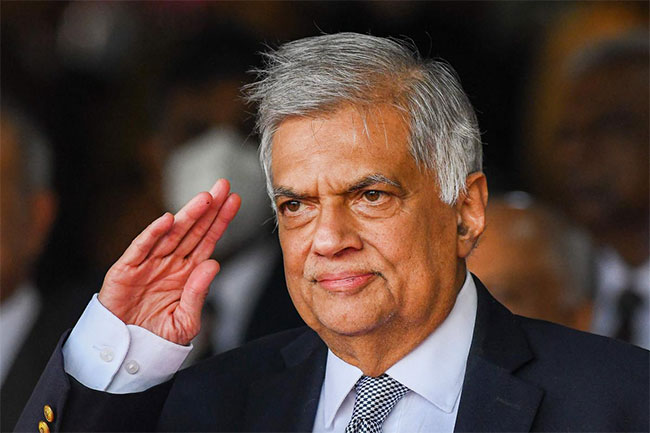
By Jehan Perera
President Ranil Wickremesinghe’s warning that he is prepared to declare a state of national emergency and use the military to suppress any public protests for change of government would reflect the pressures he is under. The manner in which he has used the security forces to deal with the protest movement has been unexpected. His words and deeds are contradictory to what he has previously stood for as a five-time former prime minister. This is especially true in the case of the ethnic and religious minorities who have consistently voted for him and his party at elections. They have felt safer and more secure under his governments which always sought to reduce the heavy hand of state oppression in which national security is given pride of place. He has always promised them much though he has been unable to deliver on much of what he promised.
Notwithstanding the unfortunate rhetoric and actions of the present time the belief still persists that President Wickremesinghe is the best of the available options. Recent pronouncements of the president have reignited hope that he will address the problems of the religious and ethnic minorities. He has stated that he does not want to leave this problem to the next generation. He has said that he wants to resolve this intractable national problem by the country’s 75th independence anniversary on February 4 next year. The hope that the president will make a fresh effort to resolve their problems has led the main Tamil party, the TNA, to desist from voting against the budget which passed with a relatively small majority. Their spokesperson, M A Sumanthiran said in Parliament that due to the president reaching out to them, stretching out his hand, they did not vote against the budget although they disagreed with it.
It is not only in words that the president has reached out to the ethnic and religious minorities. Reports from the north and east indicate that the Maveer (Heroes) Day commemorations this year took place without incident. During the past two years scores of people were arrested and a massive presence of security forces blocked the people from participating in public events. On this occasion the security forces did not get involved in any attempt to stop the commemorations. University students distributed sweets and even cut a birthday cake to celebrate slain LTTE leader Velupillai Prabhakaran’s birthday. The analogy that the president drew to himself being seen as a Hitler who exterminated ethnic and religious minorities is misplaced. The release of those held under the Prevention of Terrorism Act for engaging in similar acts in the past would further contribute to the reconciliation process.
WORSENING CRISIS
In this context, the president’s use of militaristic rhetoric can only be understood in relation to the growing economic crisis that shows no sign of abating. The anticipated IMF bailout package is at risk of getting indefinitely delayed. It was initially anticipated to come in September then in November but now January is being targeted. Japan’s top brokerage and investment bank, Nomura Holdings Inc, has warned that seven countries – Egypt, Romania, Sri Lanka, Turkey, Czech Republic, Pakistan and Hungary – are now at a high risk of currency crises. Sri Lanka is in third place on the table of risk. The next devaluation of the rupee could see another spike in inflation that will make the cost of living even more unbearable to the masses of people.
The president is on record as having said that the economic crisis will get worse before it improves. Both anecdotal and statistical evidence indicates that it is indeed worsening. University teachers at the University of Sabaragamuwa reported that attendance in their classes was down by at least a quarter. Students who come from other parts of the country are unable to afford the cost of meals and so they stay at home. A study by the Institute of Policy Studies has shown that about four percent of primary, 20 percent of secondary and 26 percent of collegiate students had dropped out of school in the estate sector, which is the worst affected. The future costs to the country of a less well educated population is incalculable and inhumane.
As it is the situation is a dire one for large swathes of the population. Research from the University of Peradeniya has revealed that close to half of Sri Lanka’s population, 42 percent (up from 14 percent in 2019) are living under the poverty line. Professor of Economics Wasantha Athukorala has said there is a dramatic increase in the poverty level of over three-hold across the past three years. In 2019, nearly 3 million people lived below the poverty line, but that number has increased to 9.6 million in October 2022. In these adverse circumstances stability in a polity can be ensured either through legitimacy or through force. It would be tragic if the latter is the choice that is made.
ELECTORAL SOLUTION
President Wickremesinghe has been stressing the importance of political stability to achieve economic development. His recent statement that the security forces will be used to negate any unauthorised protest is a sign that the government expects the conditions of economic hardship to escalate. The general public who are experiencing extreme economic hardship are appalled at the manner in which those who committed acts of corruption and violence in the past are being overlooked because they belong to the ruling party and its cliques. The IMF has made anti-corruption a prerequisite to qualify for a bailout, calling for “Reducing corruption vulnerabilities through improving fiscal transparency and public financial management, introducing a stronger anti-corruption legal framework, and conducting an in-depth governance diagnostic, supported by IMF technical assistance.”
It is morally unacceptable even if politically pragmatic that the president is failing to take action against the wrongdoers because he needs their votes in parliament. As a start, the president needs to appoint a credible and independent national procurement committee to ensure that major economic contracts are undertaken without corruption. Second, the president needs to bite the bullet on elections. The country’s burning issues would be better accepted by the country and world at large if they are being dealt with by a statesman than by a dictator. Government that is based on the people’s consent constitutes the sum and substance of democracy. This consent is manifested through free and fair elections that are regularly held. Local government elections have been postponed for a year and are reaching their legal maximum in terms of postponement. These elections need to be held before March next year.
Elections will enable the people to express their views in a democratic manner to elect their representatives for the present. This would provide the government with guidance in terms of the decisions it is being called to take to revive the economy and place the burden in a manner that will be acceptable to the people. The provincial council elections have been postponed since 2018. Democratically elected provincial councils share in the burdens of governance. The devolution of power that took place under the 13th Amendment was meant to promote ethnic harmony in the country. The president who has taken the position that he is for a solution to the ethnic conflict should seriously consider conducting the provincial council elections together with the local government elections se their financial costs. By doing so he will also gain legitimacy as a democratic statesman and not a dictator.
Features
US-CHINA RIVALRY: Maintaining Sri Lanka’s autonomy

During a discussion at the Regional Center for Strategic Studies (RCSS) in Sri Lanka on 9 December, Dr. Neil DeVotta, Professor at Wake Forest University, North Carolina, USA commented on the “gravity of a geopolitical contest that has already reshaped global politics and will continue to mould the future. For Sri Lanka – positioned at the heart of the Indian Ocean, economically fragile, and diplomatically exposed- his analysis was neither distant nor abstract. It was a warning of the world taking shape around us” (Ceylon Today, December 14, 2025).
Sri Lanka is known for ignoring warnings as it did with the recent cyclone or security lapses in the past that resulted in terrorist attacks. Professor De Votta’s warning too would most likely be ignored considering the unshakable adherence to Non-Alignment held by past and present experts who have walked the halls of the Foreign Ministry, notwithstanding the global reshaping taking place around us almost daily. In contrast, Professor DeVotta “argued that nonalignment is largely a historical notion. Few countries today are truly non-aligned. Most States claiming neutrality are in practice economically or militarily dependent on one of the great powers. Sri Lanka provides a clear example while it pursues the rhetoric of non-alignment, its reliance on Chinese investments for infrastructure projects has effectively been aligned to Beijing. Non-alignment today is more about perceptions than reality. He stressed that smaller nations must carefully manage perceptions while negotiating real strategic dependencies to maintain flexibility in an increasingly polarised world.” (Ibid).
The latest twist to non-alignment is Balancing. Advocates of such policies are under the delusion that the parties who are being “Balanced” are not perceptive enough to realise that what is going on in reality is that they are being used. Furthermore, if as Professor DeVotta says, it is “more about perception than reality”, would not Balancing strain friendly relationships by its hypocrisy? Instead, the hope for a country like Sri Lanka whose significance of its Strategic Location outweighs its size and uniqueness, is to demonstrate by its acts and deeds that Sri Lanka is perceived globally as being Neutral without partiality to any major powers if it is to maintain its autonomy and ensure its security.
DECLARATION OF NEUTRALITY AS A POLICY
Neutrality as a Foreign Policy was first publicly announced by President Gotabaya Rajapaksa during his acceptance speech in the holy city of Anuradhapura and later during his inauguration of the 8th Parliament on January 3, 2020. Since then Sri Lanka’s Political Establishment has accepted Neutrality as its Foreign Policy judging from statements made by former President Ranil Wickremesinghe, Prime Minister Dinesh Gunawardena and Foreign Ministers up to the present when President Dissanayake declared during his maiden speech at the UN General Assembly and captured by the Head Line of Daily Mirror of October 1, 2025: “AKD’s neutral, not nonaligned, stance at UNGA”
The front page of the Daily FT (Oct.9, 2024) carries a report titled “Sri Lanka reaffirms neutral diplomacy” The report states: “The Cabinet Spokesman and Foreign Minister Vijitha Herath yesterday assured that Sri Lanka maintains balanced diplomatic relations with all countries, reaffirming its policy of friends of all and enemy of none”. Quoting the Foreign Minister, the report states: “There is no favouritism. We do not consider any country to be special. Whether it is big or small, Sri Lanka maintains diplomatic relations with all countries – China, India, the US, Russia, Cuba, or Vietnam. We have no bias in our approach, he said…”
NEUTRALITY in OPERATION
“Those who are unaware of the full scope and dynamics of the Foreign Policy of Neutrality perceive it as being too weak and lacking in substance to serve the interests of Sri Lanka. In contrast, those who are ardent advocates of Non-Alignment do not realize that its concepts are a collection of principles formulated and adopted only by a group of like-minded States to meet perceived challenges in the context of a bi-polar world. In the absence of such a world order the principles formulated have lost their relevance” (https://island.lk/relevance-of-a neutral-foreign-policy).
“On the other hand, ICRC Publication on Neutrality is recognized Internationally “The sources of the international law of neutrality are customary international law and, for certain questions, international treaties, in particular the Paris Declaration of 1856, the 1907 Hague Convention No. V respecting the Rights and Duties of Neutral Powers and Persons in Case of War on Land, the 1907 Hague Convention No. XIII concerning the Rights and Duties of Neutral Powers in Naval War, the four 1949 Geneva Conventions and Additional Protocol I of 1977 (June 2022)” (Ibid).
“A few Key issues addressed in this Publication are: “THE PRINCIPLE OF INVOILABILITY of a Neutral State and THE DUTIES OF NEUTRAL STATES.
“In the process of reaffirming the concept of Neutrality, Foreign Minister Vijitha Herath stated that the Policy of Neutrality would operate in practice in the following manner: “There is no favoritism. We do not consider any country to be special. Whether it is big or small, Sri Lanka maintains diplomatic relations with all countries – China, India, the US, Russia, Cuba or Vietnam. We have no bias in our approach” (The Daily FT, Oct, 9, 2024).
“Essential features of Neutrality, such as inviolability of territory and to be free of the hegemony of power blocks were conveyed by former Foreign Minister Ali Sabry at a forum in Singapore when he stated: “We have always been clear that we are not interested in being an ally of any of these camps. We will be an independent country and work with everyone, but there are conditions. Our land and sea will not be used to threaten anyone else’s security concerns. We will not allow military bases to be built here. We will not be a pawn in their game. We do not want geopolitical games playing out in our neighbourhood, and affecting us. We are very interested in de-escalating tensions. What we could do is have strategic autonomy, negotiate with everyone as sovereign equals, strategically use completion to our advantage” (the daily morning, July 17, 2024)
In addition to the concepts and expectations of a Neutral State cited above, “the Principle of Inviolability of territory and formal position taken by a State as an integral part of ‘Principles and Duties of a Neutral State’ which is not participating in an armed conflict or which does not want to become involved” enabled Sri Lanka not to get involved in the recent Military exchanges between India and Pakistan.
However, there is a strong possibility for the US–China Rivalry to manifest itself engulfing India as well regarding resources in Sri Lanka’s Exclusive Economic Zone. While China has already made attempts to conduct research activities in and around Sri Lanka, objections raised by India have caused Sri Lanka to adopt measures to curtail Chinese activities presumably for the present. The report that the US and India are interested in conducting hydrographic surveys is bound to revive Chinese interests. In the light of such developments it is best that Sri Lanka conveys well in advance that its Policy of Neutrality requires Sri Lanka to prevent Exploration or Exploitation within its Exclusive Economic Zone under the principle of the Inviolability of territory by any country.
Another sphere where Sri Lanka’s Policy of Neutrality would be compromised is associated with Infrastructure Development. Such developments are invariably associated with unsolicited offers such as the reported $3.5 Billion offer for a 200,000 Barrels a day Refinery at Hambantota. Such a Project would fortify its presence at Hambantota as part of its Belt and Road Initiative. Such offers if entertained would prompt other Global Powers to submit similar proposals for other locations. Permitting such developments on grounds of “Balancing” would encourage rivalry and seriously threaten Sri Lanka’s independence to exercise its autonomy over its national interests.
What Sri Lanka should explore instead, is to adopt a fresh approach to develop the Infrastructure it needs. This is to first identify the Infrastructure projects it needs, then formulate its broad scope and then call for Expressions of Interest globally and Finance it with Part of the Remittances that Sri Lanka receives annually from its own citizens. In fact, considering the unabated debt that Sri Lanka is in, it is time that Sri Lanka sets up a Development Fund specifically to implement Infrastructure Projects by syphoning part of the Foreign Remittances it receives annually from its citizens . Such an approach means that it would enable Sri Lanka to exercise its autonomy free of debt.
CONCLUSION
The adherents of Non-Alignment as Sri Lanka’s Foreign Policy would not have been pleased to hear Dr. DeVotta argue that “non-alignment is largely a historical notion” during his presentation at the Regional Center for Strategic Studies in Colombo. What is encouraging though is that, despite such “historical notions”, the political establishment, starting with President Gotabaya Rajapaksa and other Presidents, Prime Ministers and Ministers of Foreign Affairs extending up to President AKD at the UNGA and Foreign Affairs Minister, Vijitha Herath, have accepted and endorsed neutrality as its foreign policy. However, this lack of congruence between the experts, some of whom are associated with Government institutions, and the Political Establishment, is detrimental to Sri Lanka’s interests.
If as Professor DeVotta warns, the future Global Order would be fashioned by US – China Rivalry, Sri Lanka has to prepare itself if it is not to become a victim of this escalating Rivalry. Since this Rivalry would engulf India a well when it comes to Sri Lanka’s Exclusive Economic Zone (EEC), Sri Lanka should declare well in advance that no Exploration or Exploitation would be permitted within its EEC on the principle of inviolability of territory under provisions of Neutrality and the UN adoption of the Indian Ocean as a Zone of Peace.
As a measure of preparedness serious consideration should be given to the recommendation cited above which is to set up a development fund by allocating part of the annual dollar remittances to finance Sri Lanka’s development without depending on foreign direct investments, export-driven strategies or the need to be flexible to negotiate dependencies; A strategy that is in keeping with Sri Lanka’s civilisational values of self-reliance. Judging from the unprecedented devastation recently experienced by Sri Lanka due to lack of preparedness and unheeded warnings, the lesson for the political establishment is to rely on the wisdom and relevance of Self-Reliance to equip Sri Lanka to face the consequences of the US–China rivalry.
by Neville Ladduwahetty ✍️
Features
1132nd RO Water purification plant opened at Mahinda MV, Kauduluwewa

A project sponsored by Perera and Sons (P&S) Company and built by Sri Lanka Navy
Petroleum Terminals Ltd
Former Managing Director Ceylon Petroleum Corporation
Former High Commissioner to Pakistan
When the 1132nd RO plant built by the Navy with funds generously provided by M/S Perera and Sons, Sri Lanka’s iconic, century-old bakery and food service chain, established in 1902, known for its network of outlets, numbering 235, in Sri Lanka. This company, established in 1902 by Philanthropist K. A. Charles Perera, well known for their efforts to help the needy and humble people. Helping people gain access to drinking water is a project launched with the help of this esteemed company.
The Chronic Kidney Disease (CKD) started spreading like a wildfire mainly in North Central, North Western and Eastern provinces. Medical experts are of the view that the main cause of the disease is the use of unsafe water for drinking and cooking. The map shows how the CKD is spreading in Sri Lanka.
In 2015, when I was the Commander of the Navy, with our Research and Development Unit of SLN led by a brilliant Marine Engineer who with his expertise and innovative skills brought LTTE Sea Tigers Wing to their knees. The famous remote-controlled explosive-laden Arrow boats to fight LTTE SEA TIGER SUCIDE BOATS menace was his innovation!). Then Captain MCP Dissanayake (2015), came up with the idea of manufacturing low- cost Reverse Osmosis Water Purification Plants. The SLN Research and development team manufactured those plants at a cost of one-tenth of an imported plant.

Gaurawa Sasthrawedi Panditha Venerable Devahuwe Wimaladhamma TheroP/Saraswathi Devi Primary School, Ashokarama Maha Viharaya, Navanagara, Medirigiriya
The Navy established FIRST such plant at Kadawatha-Rambawa in Madawachiya Divisional Secretariat area, where the CKD patients were the highest. The Plant was opened on 09 December 2015, on the 65th Anniversary of SLN. It was an extremely proud achievement by SLN
First, the plants were sponsored by officers and sailors of the Sri Lanka Navy, from a Social Responsibility Fund established, with officers and sailors contributing Rs 30 each from their salaries every month. This money Rs 30 X 50,000 Naval personnel provided us sufficient funds to build one plant every month.
Observing great work done by SLN, then President Maithripala Sirisena established a Presidential Task Force on eradicating CKD and funding was no issue to the SLN. We developed a factory line at our R and D unit at Welisara and established RO plants at double-quick time. Various companies/ organisations and individuals also funded the project. Project has been on for the last ten years under six Navy Commanders after me, namely Admiral Travis Sinniah, Admiral Sirimevan Ranasinghe, Admiral Piyal de Silva, Admiral Nishantha Ulugetenna, Admiral Priyantha Perera and present Navy Commander Vice Admiral Kanchana Banagoda.
Each plant is capable of producing up to 10,000 litres of clean drinking water a day. This means a staggering 11.32 million litres of clean drinking water every day!
The map indicates the locations of these 1132 plants.
Well done, Navy!
On the occasion of its 75th Anniversary celebrations, which fell on 09 December 2025, the Navy received the biggest honour. Venerable Thero (Venerable Dewahuwe Wimalarathana Thero, Principal of Saraswathi Devi Primary Pirivena in Medirigiriya) who delivered the sermons during opening of 1132nd RO plant, said, “Ten years ago, out of 100 funerals I attended; more than 80 were of those who died of CKD! Today, thanks to the RO plants established by the Navy, including one at my temple also, hardly any death happens in our village due to CKD! Could there be a greater honour?
Features
Poltergeist of Universities Act

 The Universities Act is back in the news – this time with the present government’s attempt to reform it through a proposed amendment (November 2025) presented by the Minister of Education, Higher Education and Vocational Education, Harini Amarasuriya, who herself is a former academic and trade unionist. The first reading of the proposed amendment has already taken place with little debate and without much attention either from the public or the university community. By all counts, the parliament and powers across political divisions seem nonchalant about the relative silence in which this amendment is making its way through the process, indicative of how low higher education has fallen among its stakeholders.
The Universities Act is back in the news – this time with the present government’s attempt to reform it through a proposed amendment (November 2025) presented by the Minister of Education, Higher Education and Vocational Education, Harini Amarasuriya, who herself is a former academic and trade unionist. The first reading of the proposed amendment has already taken place with little debate and without much attention either from the public or the university community. By all counts, the parliament and powers across political divisions seem nonchalant about the relative silence in which this amendment is making its way through the process, indicative of how low higher education has fallen among its stakeholders.
The Universities Act No. 16 of 1978 under which Sri Lankan universities are managed has generated debate, though not always loud, ever since its empowerment. Increasing politicisation of decision making in and about universities due to the deterioration of the conduct of the University Grants Commission (UGC) has been a central concern of those within the university system and without. This politicisation has been particularly acute in recent decades either as a direct result of some of the provisions in the Universities Act or the problematic interpretation of these. There has never been any doubt that the Act needs serious reform – if not a complete overhaul – to make universities more open, reflective, and productive spaces while also becoming the conscience of the nation rather than timid wastelands typified by the state of some universities and some programs.
But given the Minister’s background in what is often called progressive politics in Sri Lanka, why are many colleagues in the university system, including her own former colleagues and friends, so agitated by the present proposed amendment? The anxiety expressed by academics stem from two sources. The first concern is the presentation of the proposed amendment to parliament with no prior consultative process with academics or representative bodies on its content, and the possible urgency with which it will get pushed through parliament (if a second reading takes place as per the regular procedure) in the midst of a national crisis. The second is the content itself.
Appointment of Deans
Let me take the second point first. When it comes to the selection of deans, the existing Act states that a dean will be selected from among a faculty’s own who are heads of department. The provision was crafted this way based on the logic that a serving head of department would have administrative experience and connections that would help run a faculty in an efficient manner. Irrespective of how this worked in practice, the idea behind has merit.
By contrast, the proposed amendment suggests that a dean will be elected by the faculty from among its senior professors, professors, associate professors and senior lecturers (Grade I). In other words, a person no longer needs to be a head of department to be considered for election as a dean. While in a sense, this marks a more democratised approach to the selection, it also allows people lacking in experience to be elected by manoeuvring the electoral process within faculties.
In the existing Act, this appointment is made by the vice chancellor once a dean is elected by a given faculty. In the proposed amendment, this responsibility will shift to the university’s governing council. In the existing Act, if a dean is indisposed for a number of reasons, the vice chancellor can appoint an existing head of department to act for the necessary period of time, following on the logic outlined earlier. The new amendment would empower the vice chancellor to appoint another senior professor, professor, associate professor or senior lecturer (Grade I) from the concerned faculty in an acting capacity. Again, this appears to be a positive development.
Appointing Heads of Department
Under the current Act heads of department have been appointed from among professors, associate professors, senior lecturers or lecturers appointed by the Council upon the recommendation of the vice chancellor. The proposed amendment states the head of department should be a senior professor appointed by the Council upon the recommendation of the vice chancellor, and in the absence of a senior professor, other members of the department are to be considered. In the proposed scheme, a head of department can be removed by the Council. According to the existing Act, an acting head of department appointment can be made by the vice chancellor, while the proposed amendment shifts this responsibility to the Council, based upon the recommendation of the vice chancellor.
The amendment further states that no person should be appointed as the head of the same department for more than one term unless all other eligible people have already completed their responsibilities as heads of department. This is actually a positive development given that some individuals have managed to hang on to the head of department post for years, thereby depriving opportunities to other competent colleagues to serve in the post.
Process of amending the Universities Act
The question is, if some of the contents of the proposed amendment are positive developments, as they appear to be, why are academics anxious about its passing in parliament? This brings me to my first point, that is the way in which this amendment is being rushed through by the government. This has been clearly articulated by the Arts Faculty Teachers Association of University of Colombo. In a letter to the Minister of Education dated 9 December 2025, the Association makes two points, which have merit. First, “the bill has been drafted and tabled in Parliament for first reading without a consultative process with academics in state universities, who are this bill’s main stakeholders. We note that while the academic community may agree with its contents, the process is flawed because it is undemocratic and not transparent. There has not been adequate time for deliberation and discussion of details that may make the amendment stronger, especially in the face of the disaster situation of the country.”
Second, “AFTA’s membership also questions the urgency with which the bill is tabled in Parliament, and the subsequent unethical conduct of the UGC in requesting the postponement of dean selections and heads of department appointments in state universities in expectation of the bill’s passing in Parliament.”
These are serious concerns. No one would question the fact that the Universities Act needs to be amended. However, this must necessarily be based on a comprehensive review process. The haste to change only sections pertaining to the selection of deans and heads of department is strange, to say the least, and that too in the midst of dealing with the worst natural calamity the country has faced in living memory. To compound matters, the process also has been fast-tracked thereby compromising on the time made available to academics to make their views be known.
Similarly, the issuing of a letter by the UGC freezing all appointments of deans and heads of department, even though elections and other formalities have been carried out, is a telling instance of the government’s problematic haste and patently undemocratic process. Notably, this action comes from a government whose members, including the Education Minister herself, have stood steadfastly for sensible university reforms, before coming to power. The present process is manoeuvred in such a manner, that the proposed amendment would soon become law in the way the government requires, including all future appointments being made under this new law. Hence, the attempt to halt appointments, which were already in the pipeline, in the interim period.
It is evident that rather than undertake serious university sector reforms, the government is aiming to control universities and thereby their further politicization amenable to the present dispensation. The ostensible democratis0…..ation of the qualified pool of applicants for deanships opens up the possibilities for people lacking experience, but are proximate to the present powers that be, to hold influential positions within the university. The transfer of appointing powers to the Councils indicates the same trend. After all, Councils are partly made up of outsiders to the university, and such individuals, without exception, are political appointees. The likelihood of them adhering to the interests of the government would be very similar to the manner in which some vice chancellors appointed by the President of the country feel obligated to act.
All things considered, particularly the rushed and non-transparent process adopted thus far by the government does not show sincerity towards genuine and much needed university sector reforms. By contrast, it shows a crude intent to control universities at any cost. It is extremely regrettable that the universities in general have not taken a more proactive and principled position towards the content and the process of the proposed amendment. As I have said many times before, whatever ills that have befallen universities so far is the disastrous fallout of compromises of those within made for personal gain and greed, or the abject silence and disinterest of those within. These culprits have abandoned broader institutional development. This appears to be yet another instance of that sad process.
In this context, I have admiration for my former colleagues in the Faculty of Arts at the University of Colombo for having the ethical courage to indicate clearly the fault lines of the proposed amendment and the problems of its process. What they have asked is a postponement of the process giving them time to engage. In this context, it is indeed disappointing to see the needlessly conciliatory tone of the letter to the Education Minister by the Federation of University Teachers Association dated December 5, 2025, which sends the wrong signal.
If this government still believes it is a people’s government, the least it can do is give these academics time to engage with the proposed amendment. After all, many within the academic community helped bring the government to power. If not and if this amendment is rushed through parliament in needless haste, it will create a precedent that signals the way in which the government intends to do business in the future, abusing its parliamentary majority and denting its credibility for good.
-

 Midweek Review3 days ago
Midweek Review3 days agoHow massive Akuregoda defence complex was built with proceeds from sale of Galle Face land to Shangri-La
-

 Features6 days ago
Features6 days agoWhy Sri Lanka Still Has No Doppler Radar – and Who Should Be Held Accountable
-

 News2 days ago
News2 days agoPakistan hands over 200 tonnes of humanitarian aid to Lanka
-

 News2 days ago
News2 days agoPope fires broadside: ‘The Holy See won’t be a silent bystander to the grave disparities, injustices, and fundamental human rights violations’
-

 Latest News6 days ago
Latest News6 days agoLandslide early warnings in force in the Districts of Badulla, Kandy, Kegalle, Kurunegala, Matale, Nuwara Eliya and Ratnapura
-

 News3 days ago
News3 days agoBurnt elephant dies after delayed rescue; activists demand arrests
-
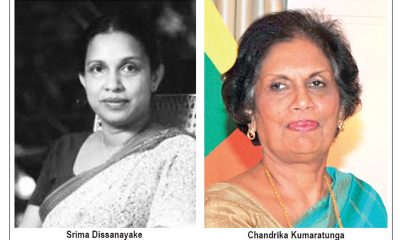
 Features6 days ago
Features6 days agoSrima Dissanayake runs for president and I get sidelined in the UNP
-

 Editorial6 days ago
Editorial6 days agoDisaster relief and shocking allegations


